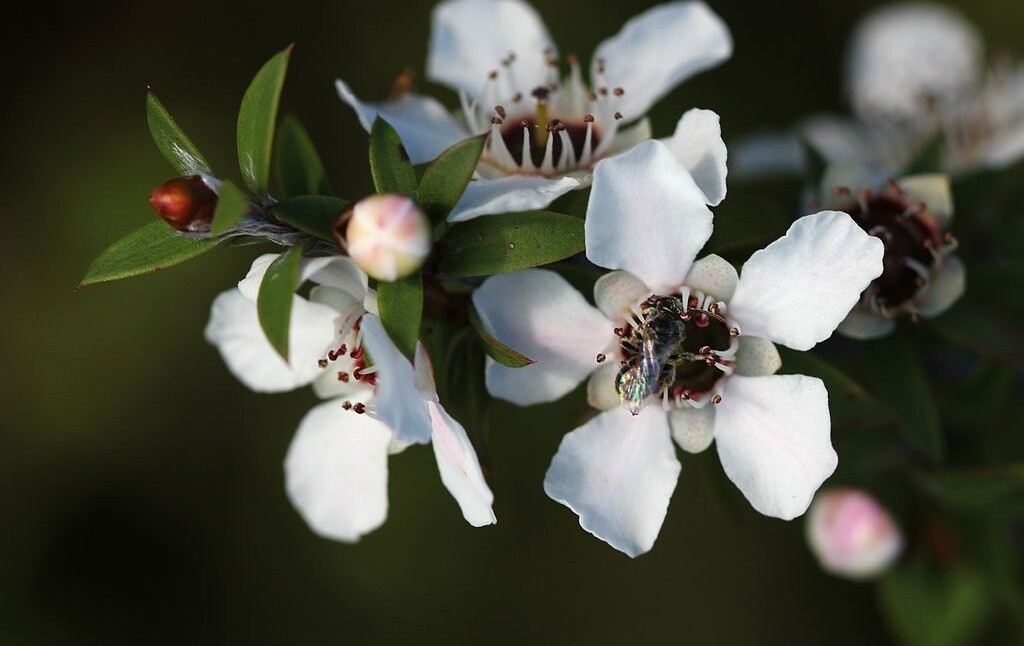
Honey has all manner of often-hidden medicine-like qualities, but more eyes will certainly be falling on Manuka honey after it was recently shown to reduce the proliferation of breast cancer cells.
It did so in a sophisticated manner that even resulted in the occasional triggering of natural cell death, or apoptosis, a mechanism that’s bypassed as a malignant cell becomes cancerous.
Manuka honey is made by bees that feed on the nectar of the manuka tree from New Zealand and coastal Australia. This member of the Myrtle family is a cousin to other plants that yield powerful medicinal products like clove, allspice, and eucalyptus.
In a study published in the journal Nutrients, investigators at the UC Los Angeles Health Jonsson Comprehensive Cancer Center found that Manuka honey significantly reduced tumor growth in mice with ER-positive breast cancer cells by 84% without affecting normal breast cells or causing major side effects.
ER-positive breast cancer makes up around 60-70% of all breast cancer cases in a given year.
It’s thought that Manuka honey is unique compared to all other commercially produced kinds of honey because of its unique chemical composition. Manuka honey has been found to be antibacterial—and not just for the bacteria a parent worries about when their child scrapes their knee—but of the kinds that cause the infections typical in cystic fibrosis patients.
“The findings provide hope for [the] development of a natural, less toxic alternative to traditional chemotherapy,” said Dr. Diana Márquez-Garbán, associate professor of medicine at UCLA, and the study’s lead author.
“Although more research is necessary to fully understand the benefits of natural compounds in cancer therapy, this study establishes a strong foundation for further exploration in this area.”
In ER-positive breast cancer, tumor cells use estrogen to grow. To combat the tumors, breast cancer patients take estrogen blockers as a non-toxic way of trying to starve them. However, cancer tumors are sometimes able to develop resistance to such treatments, leaving chemotherapy as the only alternative.
NUTRACEUTICAL NEWS: Keep Out All the Christmas Spices – They’re Powerful Antioxidants Known as ‘Nutraceuticals’
During experiments with human cancer cells in vitro, the researchers found that the best anti-cancer response was when Manuka honey was combined with the common anti-estrogen drug tamoxifen. In these circumstances, the ER-positive cell proliferation was markedly suppressed, and the combination also significantly inhibited the growth of triple-negative breast cancer, another common form, which the honey by itself could only do modestly.
In vivo experiments were then conducted in mice, during which they observed the 84% reduction in cell proliferation quoted above.
MORE MEDICINAL USES OF HONEY: Hospitals Could Use Honey and Vinegar as Antibiotic for ‘Low-Cost’ Wound Care
“These findings indicate that natural compounds such as Manuka honey, with significant antitumor activity and selectivity towards hormone receptor-positive breast cancers, may be further developed as a supplement or potential alternative to cytotoxic anticancer drugs that have more non-selective adverse effects,” the researchers concluded.
Manuka honey from New Zealand must undergo a five-stage process called the Mānuka Honey Science Definition test developed by the Ministry of Primary Industries to ensure all honey made for export is standardized to certain chemical and physical characteristics.
MORE MEDICINAL USES OF HONEY: Honey Added to Yogurt Bolsters its Bacterial Benefits–a Classic Greek Dessert Turned Medicine
This includes the presence of naturally occurring methylglyoxal, dihydroxyacetone, and leptosperin, as well as traces of the DNA of the Manuka plant. Without these, it is illegal to call a product Manuka honey. The Australian AMHA and the New Zealand UMFHA, are organizations of producers that do their part to ensure that any product labeled Manuka honey meets the standard to be called as such.
These guilds have marks of authenticity that consumers can look for to know the medicinal honey they are buying is genuine, as the amount of counterfeit Manuka honey in the market is estimated to be 6 times the amount of authentic Manuka honey.
SHARE This Amazing Discovery About The Doctor Honey…
Editor’s note: This story has been corrected from a previous version to reflect that cystic fibrosis is a genetic disorder that increases patients vulnerability to bacteria.



















